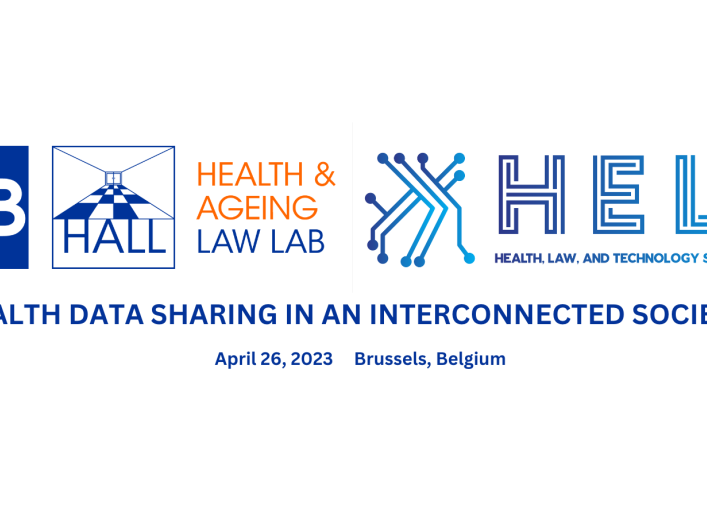
HEALTH, LAW, AND TECHNOLOGY (HELT) SYMPOSIUM 2023
The Health and Ageing Law Lab (HALL) is organising its inaugural HELT (Health, law, and Technology) Symposium 2023. The symposium will take place on 26th April 2023 at the ‘Sparks Venue – Rue Ravenstein 60’ in the center of Brussels.
Read more

Prof. Mireille Hildebrandt presents at Women in Data Science conference in Maastricht (7 March 2023)
Prof. Mireille Hildebrandt will give a presentation on the 7th of March 2023 at the fourth edition of the Women in Data Science (WiDS) 2023 Conference in Maastricht.
Read more

Prof. Mireille Hildebrandt participates in debate on smart technologies and climate change from the perspective of the rule of law (20 Feb 2023)
On 20 February (at 8pm) Prof. Mireille Hildebrandt will participate in a debate (in Dutch) held at De Balie in Amsterdam on the topic of "menselijk recht in tijden van datasturing and natuurgeweld" (human-made law in the era of data control and natural disasters).
Read more

Call for Abstracts - Symposium: Human Agency, Digital Society and Data-Intensive Surveillance
The VUB Chair in Surveillance Studies in collaboration with CENSUS, IEA, and supported by SSN, organises an international, trans-disciplinary and multilingual symposium on Human Agency, Digital Society and Data-Intensive Surveillance at the Paris Institute for Advanced Study,&nbs...
Read more

The VUB Chair in Surveillance Studies announces upcoming seminars
The preliminary schedule for the VUB Chair in Surveillance Studies' upcoming seminars is now available on their website.
Read more

The VUB Chair in Surveillance Studies publishes Workshop Report on Oversight of Police-Use of Surveillance Technology
The report documents the main findings of a workshop on the Police-Use of Surveillance Technology hosted by the VUB Chair in Surveillance Studies.
Read more

Prof. Mireille Hildebrandt delivers keynote at BIOSTEC 2023 conference (17 Febr 2023)
During the 16th International Joint Conference on Biomedical Engineering Systems and Technologies BIOSTEC 2023 (16-18 February 2023), Prof.
Read more

LSTS website under construction (16/12/2022 to 15/01/2023)
Please note that the LSTS website is undergoing some reconstruction from 16/12/2022 to ca. 15/01/2023. The website will still be available in its current form to all visitors, but new content will not be added during this time.
Read more

Prof. Mireille Hildebrandt delivers a keynote on the Typology of Legal Tech at IURIX2022 conference (16 Dec 2022)
Prof. Mireille Hildebrandt has been invited to give a keynote at IURIX2022, the annual conference on the intersection of law, Artificial Intelligence and Information Systems, under the auspices of the JURIX Foundation for Legal Knowledge Systems.
Read more

LSTS and HALL Researcher Olga Gkotsopoulou speaks about (in)accessibility at IGF 2022 (29 November 2022)
The United Nations Internet Governance Forum (IGF) brings people together from various stakeholder groups to discuss public policy issues relating to the Internet.
Read more

The Proposed Data Act and its implications for business-to-government data sharing in smart cities (November 2022)
Marie-Sklodowska Curie Action's Fellow Barbara Lazarotto (LSTS) reflects on public-private data sharing and its implications on data subjects' rights. The Data Act was the last proposed Act of the European Data Strategy, issued on February 2022.
Read more

Dr Desara Dushi co-authors 'Imagining the AI Landscape after the AI Act 2022' workshop proceedings
In June 2022, Dr Desara Dushi co-organised in conjunction with the International Conference on Hybrid Human-Artificial Intelligence the 1st International Workshop on Imagining the AI Landscape After the AI Act aimed at analysing how the new AI regulation will shape the AI technologies of the futur...
Read more
